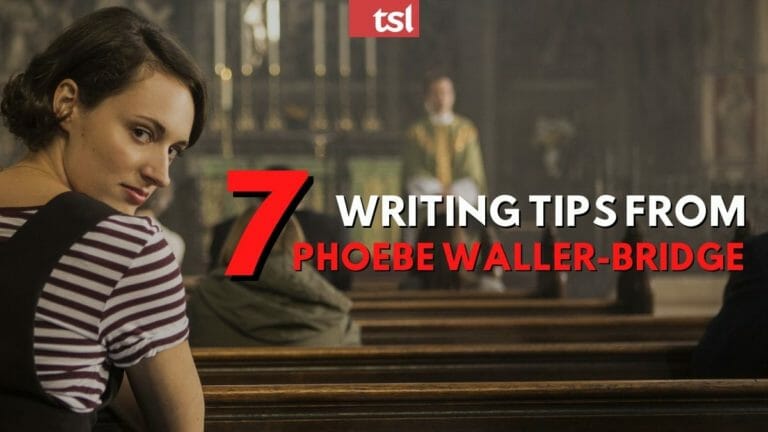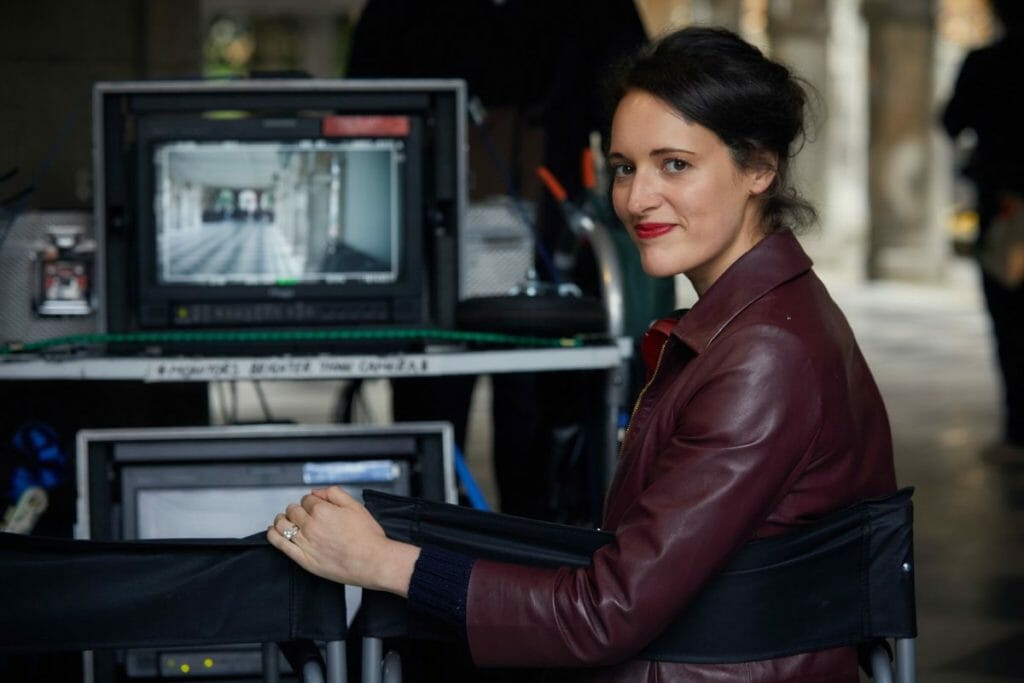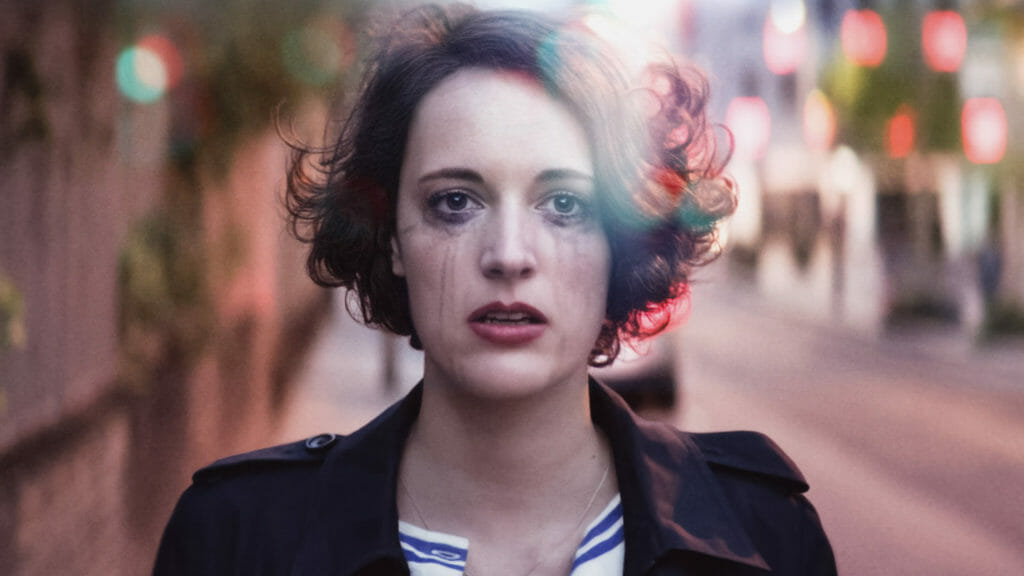Sign up for the
TSL Newsletter
and get $50 off Final Draft 12
By Britton Perelman · April 20, 2021

Phoebe Waller-Bridge, the genius writer and actor of Fleabag fame, stumbled into writing because she wanted to create interesting work for herself as an actor. It’s an understatement to say she found her calling in putting words on the page.
Read on for seven writing tips from the brilliant Phoebe Waller-Bridge.
“I did a lot of drafts for the pilot. Mainly because I have no problem with throwing things out. In fact, I get a kick out of it. I have discarded full episodes of Fleabag that have nothing to do with the series now.”
One of the toughest things to learn as a writer is the subtle art of throwing your ideas in the trash. It’s not easy to accept that a certain storyline or plot point isn’t working, and it can be damn near impossible to give up on something you’ve spent many hours working on. But Phoebe Waller-Bridge (or PWB, if you will) discards ideas with an attitude that approaches pure glee. After all, every idea you throw out brings you closer to the best version of your story.
“I don’t think you can really stop working when you’re writing. It’s always with you, everywhere you go. Your brain is constantly churning things over, generating ideas or unpicking knots.”
A writer’s work is never done, especially since we create things out of nothing. Our minds are always spinning possibilities for whatever story we’re currently working on, no matter the hour, location, or extenuating circumstance. And you never know when inspiration will hit. PWB herself is known to ride the Tube just to mull over ideas, so nothing’s off the table!
“The first scene I wrote for [Fleabag] series two is the scene in the bathroom where Fleabag is there with a bloody nose, turns to camera, and says, ‘This is a love story.’ The producers loved it and said, ‘What happens next?’ and I said, ‘I have no idea!’ I was just excited by it, and then worked back from there to figure out who she’d hate enough to punch.”
Let’s face it, we don’t always know where our stories are going. PWB would argue that that’s a good thing. If your story surprises you, that probably means something is working. Follow that instinct and let your characters lead the way. Because if you’re excited by the prospect of where something could lead, chances are your audience will be too.

Phoebe Waller-Bridge on the set of ‘Killing Eve’ (credit: Robert Viglasky)
“I always think there should be at least three things going on in one scene at the same time.”
A scene about a young woman meeting with a banker isn’t very interesting. But when the young woman is late, completely unprepared, and sweating profusely (causing her to accidentally flash the banker in question, who, by the way, had an issue with sexual harassment recently), the scene becomes instantly compelling. “I feel like the more you put on a person, the more real it feels, because otherwise it’s just a conversation about a bank loan,” explained PWB. Your characters should be real people with real issues, and how often do we simply deal with one thing at a time? Life is much more complicated, and your scenes should reflect that.
“I try to disarm an audience as much as I can with comedy and then punch them in the gut with a drama when they least expect it.”
Some of the most affecting moments in Fleabag come right on the heels of a joke. Just when you think it’s all laughter and smiles, Phoebe Waller-Bridge smashes you to bits with a dramatic line or sequence. It all traces back to PWB’s belief that people are vulnerable when they laugh, which leaves them exposed for moments of depth and drama. (In fact, PWB believes that when audiences laugh, they’re basically begging to have their hearts broken.) Comedy and drama may be categories of genre, but they’re also tools writers must have in their arsenal. Use both, no matter what genre your writing falls in, and you’ll create stories that mimic real life.
“Find one friend that you love and care about and write it for that person, to make that person laugh and to make that person cry.”
Being a writer is hard. Being a writer when you’re trying to please hundreds, maybe thousands, of people is even harder. “Don’t try to impress an audience that doesn’t even exist yet,” PWB says.
When Phoebe Waller-Bridge was writing the first episodes of Fleabag, she wrote with her friend Vicky Jones in mind. All she cared about was if Vicky enjoyed the story. And it certainly worked, because now millions of viewers love Fleabag just as much. So don’t try to impress everyone. Just impress one person — even if it’s yourself.
“Sometimes you feel it’s braver to say something outrageous, and it’s not always. Sometimes it’s braver to say the vulnerable thing.”
Each episode of Fleabag features at least one line that is hilarious, painful, or breathtaking in its honesty. “Why believe in something awful when you could believe in something wonderful?” “Love isn’t something that weak people do.” “People are all we’ve got.” “I sometimes worry I’d be less of a feminist if I had bigger tits.”
Fleabag is striking in its vulnerability. And it’s because Phoebe Waller-Bridge understands that sometimes saying the vulnerable thing is incredibly brave. It takes guts to write the thing we’re all thinking but won’t say aloud. But if you can find the courage to be vulnerable, your writing will be infinitely better.

Phoebe Waller-Bridge in ‘Fleabag’
Phoebe Waller-Bridge is a well of inspiration when it comes to writing. The writer and actress extraordinaire may make writing look easy, but we all know it’s much more difficult in practice.
Just remember, if you’re not sure what to do, ask yourself these questions: “What would I do if I wasn’t afraid? What would I write it if I wasn’t afraid? What would I say in this situation if I wasn’t afraid?”
And then write like you’re not afraid.
Want to learn even more from Phoebe Waller-Bridge? Download these Fleabag screenplays for FREE from the TSL Script Library!
Fleabag: Season 1 - EP. 1 Fleabag: Season 2 - EP. 1The Script Lab 2021 Screenplay Contest is now open and 100% FREE TO ENTER! Early Deadline ends April 30th.